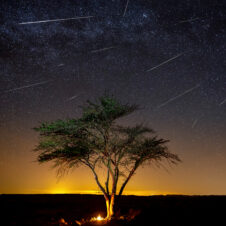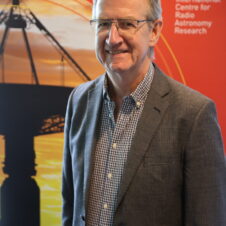
ICRAR-UWA has been awarded the Gold level of the ASA’s Pleiades Awards, recognising our ‘exceptional and sustained demonstration of equity in the workplace, and an ongoing commitment to advancing diversity and inclusion in Astronomy and a national level’.
The International Centre for Radio Astronomy Research (ICRAR) has been recognised by the Astronomical Society of Australia for its commitment to advancing diversity and inclusion in astronomical sciences and technology.
The Curtin University node of ICRAR was presented with a Silver Pleiades Award and the Centre’s UWA node achieved a Gold Pleiades Award.
The Pleiades Awards recognise organisations in Australian astronomy that take active steps to advance the careers of a diverse population and strive for sustained improvement in providing opportunities for under represented groups to achieve positions of seniority, influence and recognition.
Luca Cortese, who chairs ICRAR-UWA’s Diversity, Equality and Inclusion Committee, said the UWA Node of ICRAR is the only institute in Australia to be awarded the Gold Award in the current round.
“One key initiative we established several years ago is the ICRAR Visiting Fellowship for Senior Women in Astronomy. This fellowship is aimed at providing an opportunity for senior women astronomers to visit ICRAR and interact with our researchers and graduate students,” said Dr Cortese.
“The Fellowship also creates opportunities for our young researchers to learn career development and work-life balance strategies from these international role models.”
Gemma Anderson, chair of the ICRAR-Curtin Pleiades Committee, said that ICRAR’s Curtin node have worked closely with Curtin Athena SWAN to ensure informed and effective initiatives across the institute, as well as activities and surveys that are University and Ethics approved.
“At ICRAR/Curtin we have worked hard to improve the working environment for all staff and students. In particular, we have focused on supporting and recognising the contributions of marginalised and under-represented groups, breaking down unconscious biases, and providing personal and professional development opportunities for all,” Dr Anderson said.
“The silver award recognises the considerable efforts and ongoing commitment of our department to achieve inclusion, diversity and equity in astronomy.”
Associate Director Renu Sharma says ICRAR is a very supportive, inclusive and diverse organisation that greatly values not only gender equality but also diversity.
“We’ve taken proactive and practical measures to create this environment and see this as an area of constant focus and attention.”
“Staff and students are attracted from all over the globe. There are 41 languages spoken at ICRAR, English is the most common followed by French, German, Hindi and Chinese and 37 countries are represented. We’re proud to have such a diverse workforce,” Renu says.


